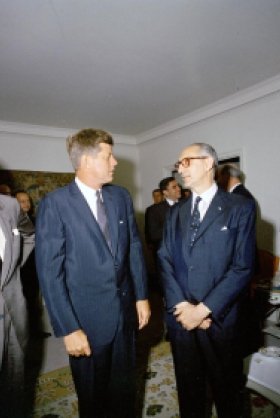John F. Kennedy, Arturo Frondizi, and a "Hopping Mad" US Ambassador



CWIHP Working Paper 97
Fake History? The Case of the "Falsified"(?) Letter: US-Argentina Relations, 1961-1962: John F. Kennedy, Arturo Frondizi, and a "Hopping Mad" US Ambassador
James G. Hershberg
January 2024
It has long been known that relations between John F. Kennedy's United States and Arturo Frondizi's Argentina during JFK's first year in office as president (and Frondizi's last) were cordial on the surface, but also somewhat strained, particularly by differences over how to handle Fidel Castro's Cuba. This paper examines new evidence from Frondizi's papers, complemented by declassified U.S. records, to show that this divergence extended to the Argentine leader's suspicions that figures at the American Embassy in Buenos Aires--from CIA agents to military officers to Ambassador Roy R. Rubottom--were conspiring with hardline Argentine military figures seeking to overthrow him. The Argentine records offer new insights into the dealings between Frondizi and JFK, including their two summits, in New York and Florida, in late 1961; into the early, abrupt end of Rubottom's term as ambassador to Argentina; and into the tensions over Cuba that hastened the Argentine military's ouster of Frondizi in early 1962, shortly after Buenos Aires resisted Washington's pressure to take a harder line against Havana at the Organization of American States (OAS) foreign ministers meeting at Punta del Este, Uruguay.
Click here to download this Working Paper as a PDF.
Author

Professor of History and International Affairs at George Washington University

Cold War International History Project
The Cold War International History Project supports the full and prompt release of historical materials by governments on all sides of the Cold War. Read more


History and Public Policy Program
A leader in making key foreign policy records accessible and fostering informed scholarship, analysis, and discussion on international affairs, past and present. Read more



